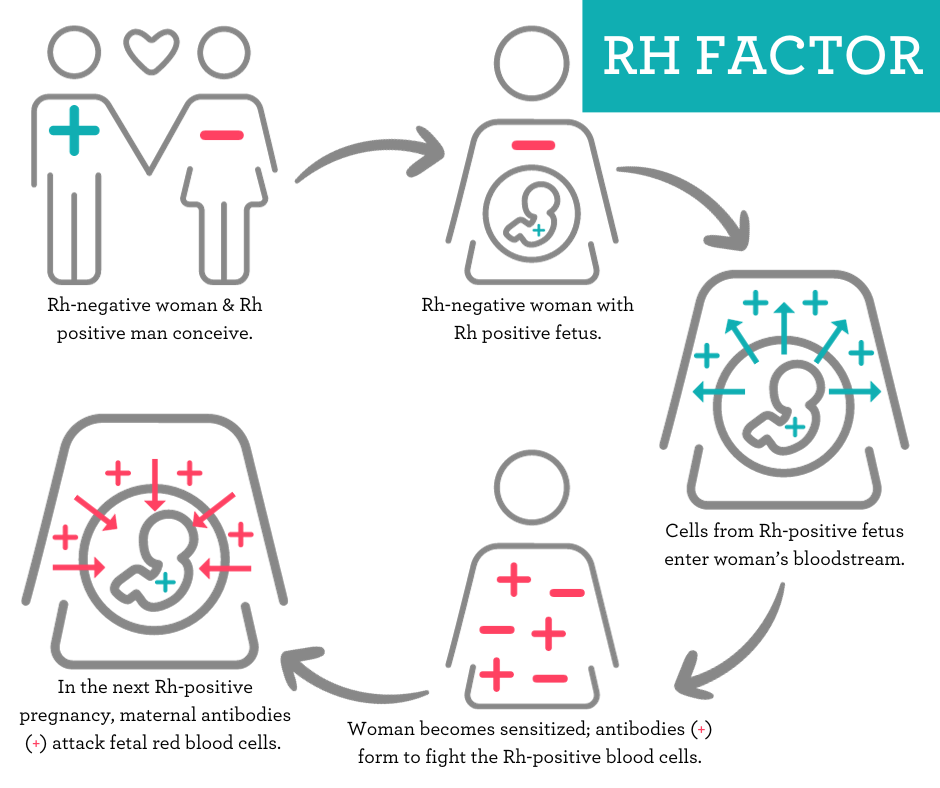Has anyone ever asked you, “What’s your blood type?”
If you know the answer, you might say O negative or A positive. But what does that even mean?
Blood types are determined by molecules on the surface of your red blood cells. They are then classified by the absence/presence of A or B antigens and Rh factor on the cells’ surfaces. Blood types are identified with a letter (A, B, AB, or O) followed by a positive or negative sign (+/-). The positive or negative sign represents whether a person possesses Rh factor.
While Rh positive is the more common blood type, plenty of people are Rh negative. An Rh-negative person does not have this protein on the surface of their red blood cells.
So, one more time, what’s your blood type?
This is a very important question if you are pregnant. It’s especially important if this is your first pregnancy. Even if that pregnancy ends in miscarriage, ectopic pregnancy, or abortion, the answer to this question matters for every pregnant person (especially those who may experience future pregnancies).
What is the Rh Factor?
In the same way that there are different major blood groups (type A, type B, type O), there is also what is called an “Rh Factor.” The Rh factor is an inherited protein found on the surface of your body’s red blood cells.
Most people have the Rh factor. This is called being Rh positive. Some people do not have the Rh factor. This is called being Rh negative.
How Can a Woman Have a Different Rh Factor than Her Pregnancy?
Rh factor is inherited genetically. It can be inherited from either mother or father. Most people are Rh positive, which means they have inherited the Rh factor from their mother or their father. Whenever a fetus does not inherit the Rh factor from either parent, they are considered Rh negative.
If a woman is Rh negative but her partner is Rh positive, it is possible for the fetus to inherit that gene from the father. In that case, the pregnant person is Rh negative while her growing fetus is Rh positive–this is called Rh incompatibility.
How Does Rh Incompatibility Affect Pregnancy?
Rh factor causes problems when an Rh-negative person’s blood comes in contact with an Rh-positive person’s blood. When someone becomes pregnant, she and her growing embryo do not share blood systems. However, it is possible for a small amount of blood to pass through the placenta into the pregnant woman’s system. (Blood can also mix during labor and birth or due to various circumstances during pregnancy.)
Imagine that there is an Rh-negative woman who is pregnant for the first time, and her developing embryo is Rh positive. Let’s call her Bella. If the embryo’s blood crosses into Bella’s system, her body will become sensitized to that Rh-positive blood. When this happens, Bella’s body creates antibodies that will attack the blood of any subsequent pregnancies that are also Rh positive. The red blood cells in future pregnancies will be attacked, causing anemia, serious illness, brain damage, or even miscarriage. The initial pregnancy and each subsequent pregnancy must be treated. In most cases, the condition worsens with each new pregnancy.
Why Does My Rh Factor Matter?
Rh factor matters whether you plan to carry your pregnancy to term or to have a medical or surgical abortion. It matters if you have an ectopic pregnancy or a miscarriage. Rh factor must be tested for your first pregnancy, regardless of how that pregnancy ends. Why? Because if you are Rh negative, then your body may have already created the antibodies that will fight against any future Rh-positive pregnancy.
A simple blood test can tell you your blood type and whether you are Rh positive or Rh negative. Another blood test, called an antibody screen, can show if an Rh-negative woman has already developed antibodies to Rh-positive blood.
Rh Factor: A Summary
Whew! That was a lot of information. Are you still here?
For our visual learners, let’s summarize with an illustration:

Can Rh Incompatibility be Treated?
The good news is that Rh incompatibility during pregnancy can be prevented! Treatment aims to stop an Rh-negative woman from making Rh antibodies in the first place. This is why you should be tested for Rh factor early in pregnancy (or even before pregnancy). If needed, you can be given medication to prevent antibodies from forming. Rh treatment does not help if the antibodies have already been developed.
The medication used to treat this is called RhoGAM. RhoGAM is an injection used to prevent Rh incompatibility from developing. It acts as a “barrier” to protect the woman’s blood from reacting to the fetus’ Rh-positive cells.
So what should you do?
- Know your blood type! (Usually, during your first prenatal visit, the physician will order this test if it hasn’t been done yet.)
- If you have a negative blood type, make sure to talk to your clinician before and during your first pregnancy.
- If you have already experienced your first pregnancy, get an antibody screen. If tests show you have developed Rh antibodies, talk to your doctor about next steps.
Contact your healthcare provider for more information about Rh factor. A referral can be given to you by our staff here at Clearway Clinic. Call our office at (508) 438-0144 for more information.
Reviewed by Rebekah, MSN RN
Resources:
- https://www.acog.org/womens-health/faqs/the-rh-factor-how-it-can-affect-your-pregnancy#:~:text=The%20Rh%20factor%20is%20a,refers%20to%20your%20Rh%20status.
- https://www.redcrossblood.org/local-homepage/news/article/what-is-the-rh-factor–why-is-it-important-.html#:~:text=The%20Rh%20factor%20is%20an,cells%20lack%20the%20Rh%20protein.
Please note: The information in this article is not meant to replace advice from a medical professional. Talk to your medical provider for questions and information about Rh factor and other topics.




